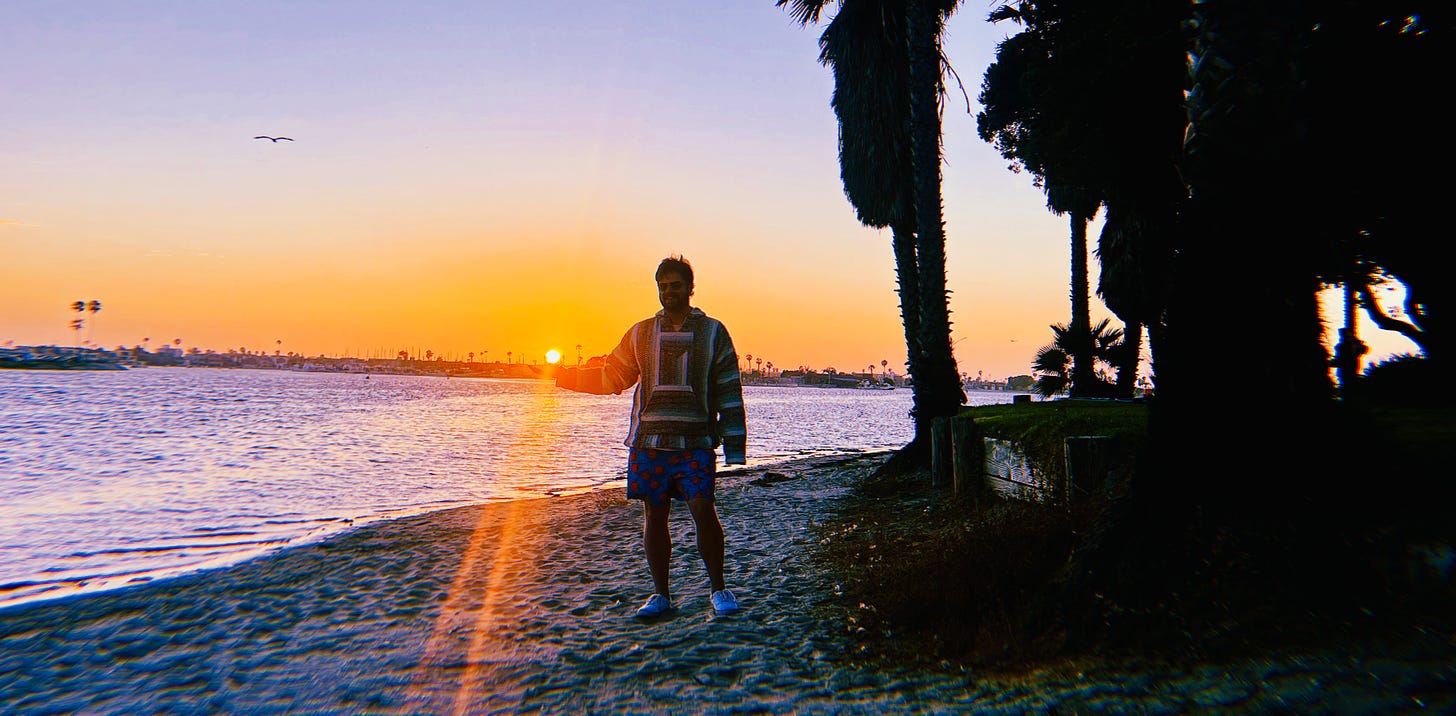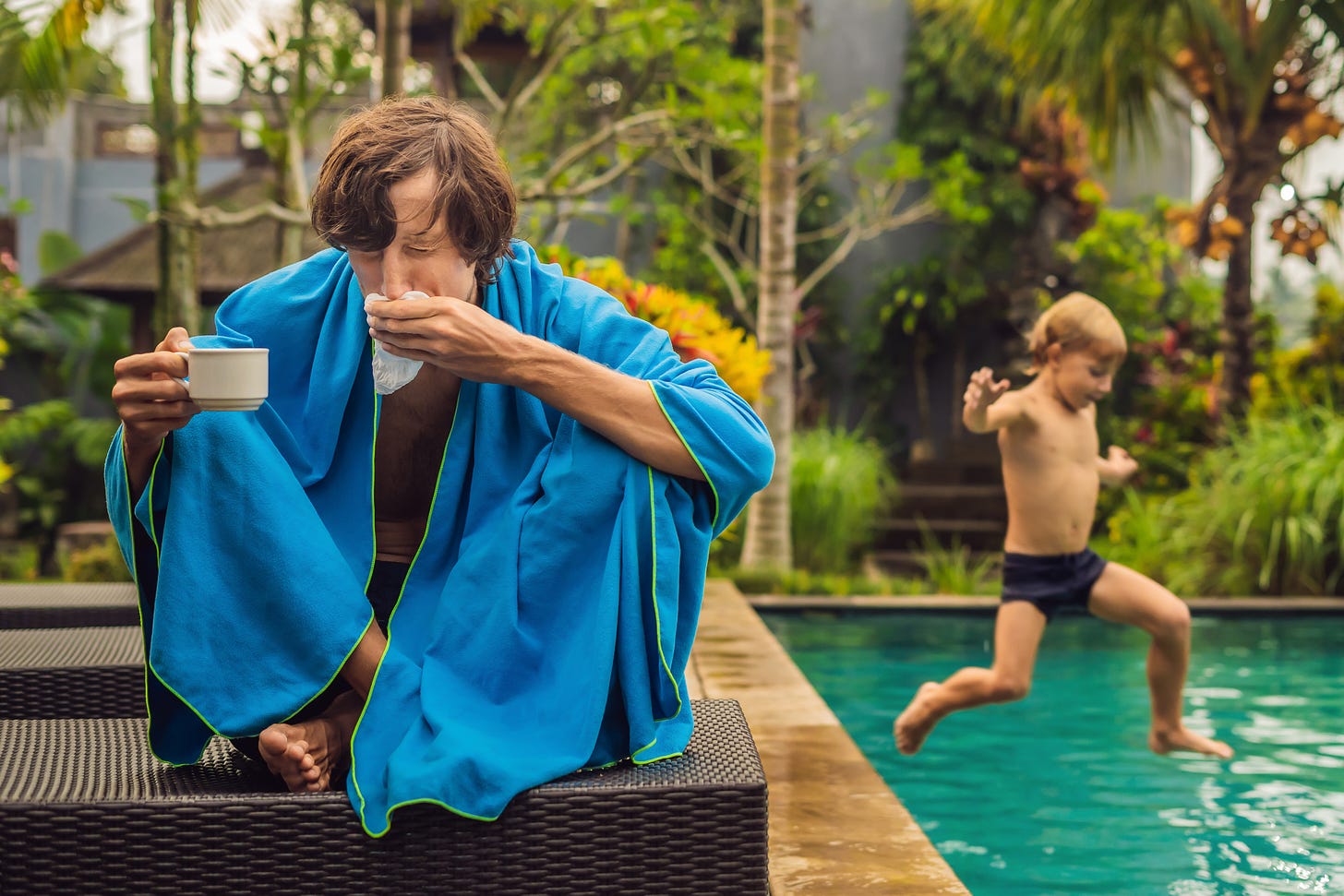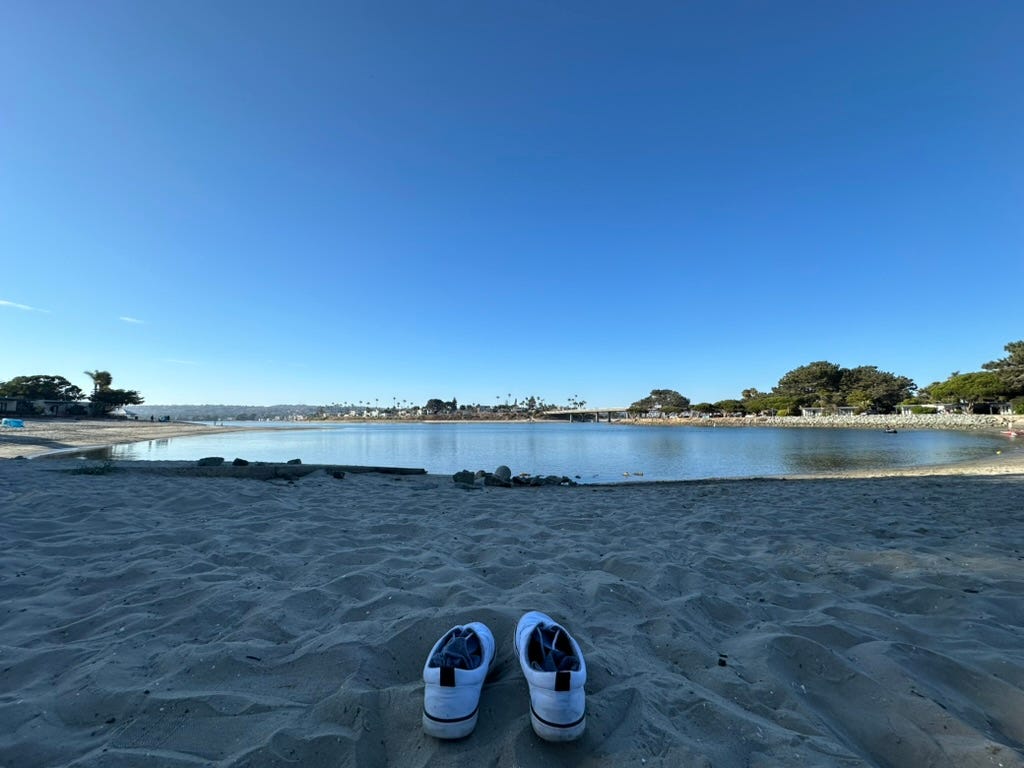Hey! It’s my first blog in a long time, so I ask for your love and support! A like, a comment, and even a subscribe would mean the world to me!
I just got back from my first vacation in over a year, and something strange happened.
I didn’t get sick.
For fifteen years, every vacation started with a day or two of feeling like death warmed over. It was as predictable as a sunburn and overpriced cocktails. I’d be cruising to Bermuda, and instead of sipping my complimentary mimosas on an overcrowded pool deck, I would be doing my best imitation of corpse pose in bed.
Once, I even startled housekeeping so badly that they called the ship's doctor to check on me. I had reached a stillness so profound that my yoga teacher would have called me a guru.
But not this time.
Instead, I experienced the tropical paradise I planned (and paid) for, complete with turquoise waters, swaying palm trees, and me, sprawled on a beach towel, sporting a questionable sunburn and an even more questionable grin. Shocking, I know. This was NOT how my vacations usually went down.
What changed for me?
I stopped thinking about my life in terms of “work” and “life.” I let go of my obsession with work/life balance. And I finally accepted that it's all life, no dichotomy included.
My vacations were a microcosm of a larger, more insidious cycle. After enduring a day (or perhaps two) of feeling like a truck had hit me, I'd miraculously bounce back. Rejuvenated, refreshed, ready to conquer the world (or at least my inbox).
It was a bizarre pattern I came to accept, even anticipate.
I'd schedule my getaways around the inevitable illness, strategically adding a few extra "sick days" to the itinerary. I'd pack enough cold medicine, zinc, and Airborne to medicate a small army. Hell, I even started looking forward to the brief respite from responsibility, the excuse to wallow in self-pity and binge-watch bad TV.
But as the vacation high faded, so did my energy. I'd return home to the same 60-70-hour work weeks, the endless to-do lists, the takeout dinners eaten over a pile of spreadsheets, the sporadic gym visits, the wine-fueled nights out, and the fleeting moments of "self-care" that were more about numbing the pain than actually healing.
And the cycle would repeat itself. Burn out, take a vacation, get sick, recover, repeat.
The culprit, in my mind, was always my job. The long hours, the demanding boss, the never-ending meetings – they were the villains in my personal narrative of woe. I clung to the elusive promise of work-life balance. I was sure that if I could just escape my 9-to-5 (or more like 8-to-8), everything else would magically fall into place.
But as I researched and reflected, I stumbled upon a concept that shed new light on my vacation woes: the "let-down effect."
It turns out that our bodies don't like it when we go from intense stress to sudden relaxation. It's like slamming on the brakes after a high-speed chase – things are bound to get messy.
This abrupt shift can trigger a cascade of biochemical changes, weakening our immune system and leaving us vulnerable to illness. But it doesn't have to be as dramatic as a full-blown vacation flu. The let-down effect can manifest as a weekend spent on the couch, nursing a headache, and a vague sense of malaise. It's the reason we're more likely to end up in the ER with a stress-induced ulcer on a Sunday than a Wednesday.
The more I learned about this phenomenon, the more I realized that it wasn't just my job that was to blame for my vacation-induced misery. It was my entire approach to life – the constant push and pull, the neglect of my own well-being, the desperate attempts to compartmentalize the chaos.
The truth is, there is no such thing as work-life balance.
It's all life, an intricate dance of interconnected parts. Our jobs, relationships, health, passions—the list goes on—all influence and shape each other. When one aspect of our lives suffers, it creates a ripple effect that can disrupt the delicate harmony of the whole.
The past 1.5 years of my life have been among the hardest. They beat out my PhD years. Honestly, they compare with some of my original traumas when I was 17 and 18.
So it really did surprise me when I wasn’t laid flat-out sick in San Diego.
Was it really just coming to a realization that a dichotomy isn’t the right way of managing the harmony of my life?
Well, no, not just that.
But it was the important first step that I took. I needed to let go of the illusion that I could compartmentalize my life perfectly. Instead, I began to embrace the messiness and complexity.
And look, I'm not claiming to have achieved some kind of zen-like nirvana. I still have days when I want to throw my to-do list out the window and hide under the covers. But something has fundamentally changed. I no longer see my life as a series of separate, warring factions. It's all connected, one big, beautiful, messy whole. And when one part of the orchestra gets out of tune, I've got the tools to bring it back into harmony.
There is genuine relief that comes from letting go of our need to compartmentalize and control. There is peace that comes from surrendering to the ecosystem that is life and from the knowledge that it is complex. It is messy. And it will be okay.
By finally surrendering, I freed up the capacity in my life to take care of the whole me. I had permission to create practices that nurtured all aspects of my being rather than catering to a specific part. And I stopped coping and started restoring myself.
It's not just about self-care or stress management. It's about cultivating self-compassion and empathy. And gratitude. Plus, resilience. And a deep understanding of how our bodies and minds react to the world.
And then the hardest part?
Doing it.
That meant I had to prioritize myself. I had to put my needs, restorative practices, and time above others (and my work).
It forced me to have honest conversations that I never thought I would have, caused me to renegotiate my boundaries, and led me to answers about my life goals and what I truly wanted. I had been hiding from them because they were too hard to think about.
I had to take care of myself, holistically.
I had no more room to hide behind the “work/life” balance dichotomy, which simply served as a convenient distraction from the truth.
If you feel like you've somehow mastered the art of life balance, then kudos to you! Keep doing what works.
And hey, drop a comment below – we could all use some tips.
Like most of us, though, you'll discover value in delving deeper into this. I find that it is a constant journey of exploration for myself. Because I am always changing, and life is always changing.
So, in the spirit of self-discovery, here are a few questions to ponder:
How does the myth of work-life balance manifest in your life? Where does it focus your attention and energy?
How does this myth shape your perspective? How does it bias you towards parts of your life? Are you prioritizing one aspect at the expense of others?
What parts of your life suffer from unintentional neglect? Are you sacrificing your health, relationships, or passions on the altar of "balance?”
What do you do to restore balance in your life? Do these practices heal the core issue or mask surface problems?
How holistic are your self-care practices? Are you addressing your physical, mental, emotional, and spiritual needs?
Take some time to reflect on these questions. Be honest with yourself, even if it's uncomfortable. And remember, it's not about achieving some unattainable ideal. It's about finding what works for you in this moment and embracing the ever-changing dance of life.
Share Your Insights:
I'd love to hear your thoughts on this! Have you experienced the let-down effect? How has the myth of work-life balance affected your life? What strategies have you found helpful for embracing the interconnectedness of it all?
Leave a comment below, and let's start a conversation!








I was definitely familiar with this concept but didn't know it had a name! I enjoyed reading about this and especially loved the idea that "it's all life" and so remove the concept of work-life balance as if they're different things. I totally used to live for the weekend, but as you say, all of life becomes so much more enjoyable when we take responsibility for enjoying ALL of it, not just our free time. Thanks for that reminder 🥰
Coincidentally, I've been working on a draft of this exact idea! But now, since reading yours, I'm not sure if I can do it justice.
If we spend more time at work than at home, then how in the world could that not be part of our life?
This whole idea that we're missing out all the time is to blame for a lot of depression, I think.
Sure, maybe we need to examine our situation and make changes if the daytime activities are taking over everything. But it's still a part of our experience.